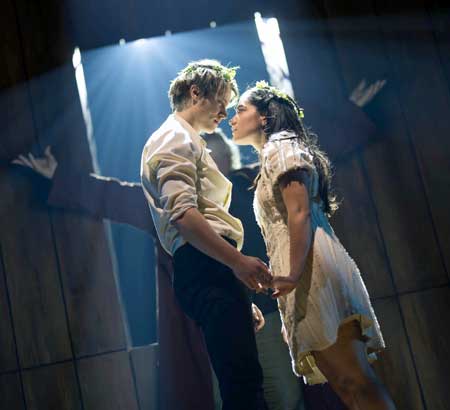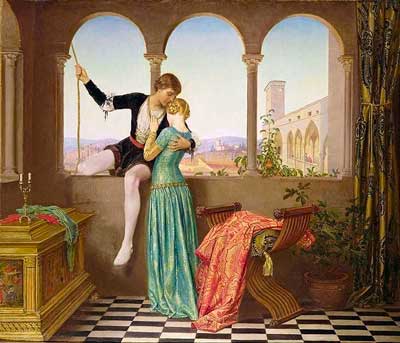Play (1597)
by William Shakespeare
Directed by Diane Paulus
American Repertory Theater
August 31 – October 6, 2024
Scenic Design: Amy Rubin; Costume Design: Emilio Sosa; Lighting Design: Jen Schriever; Sound Design: Daniel Lundberg; Original Music Composed by Alexandre Dai Castaing; Hair, Wig, & Make-up Design: J. Jared Janas; Fight Consultant: Thomas Schall; Production Stage Manager: Melissa Chacón
With Terence Archie (Lord Capulet), Jason Bowen (Prince), Sharon Catherine Brown (Nurse), Bradley Dean (Lord Montague, Friar John), Brandon Dial (Benvolio), Adi Dixit (Paris), Terrence Mann (Friar Laurence), Abiola Obatolu (Lady Montague), Rudy Pankow (Romeo), Alex Ross (Tybalt), Will Savarere (Abraham, Peter), Adam Shaukat (Sampson, Apothecary), Clay Singer (Mercutio), Emilia Suárez (Juliet), Nicole Villamil (Lady Capulet)

Emilia Suárez as Juliet
in “Romeo and Juliet”
Photo: Photo: Nile Scott Studios and Maggie Hall
Courtesy of American Repertory Theater
In Verona, the Capulet and the Montague families are at one another’s throats but that does not prevent Romeo Montague (Rudy Pankow) from falling head over heels for Juliet Capulet (Emilia Suárez). Of course, there are difficulties, apart from the fact that the parents won’t hear of it. Smitten, the two lovers enlist Friar Laurence (Terrence Mann) to marry them in short order, unbeknownst to the families, and Mr. (Terence Archie) and Mrs. (Nicole Villamil) Capulet are still strongly pushing for Juliet to marry Paris (Adi Dixit), a dullard and a fop. Add to that the additional complication that Tybalt (Alex Ross), in the Capulet crowd, gets into a fight with Mercutio (Clay Singer), from the Montague crowd, and kills him. Though Romeo has initially tried to break up the fight, he responds in a rage and kills Tybalt. What a mess. Romeo is banished and Juliet is in despair over not only having her beloved at exilic remove, but also, despite her secret marriage to Romeo, is being slated for marriage to Paris, pronto. Friar Laurence comes up with the plan that if Juliet takes a sleeping potion, it can fool everyone into thinking that she has died, so they will put her in the family crypt where Romeo can come and save her. Of course, Romeo would need to be clued in on this, but the letter that Friar Laurence tries to send Romeo gets lost in the mail, and Romeo, hearing of Juliet’s death, comes back to the crypt where he drinks poison. Of course, Juliet wakes up, finds Romeo dead, then stabs herself. Nothing too pretty, all around.
The most wonderful thing about this production is the stellar performance by Emilia Suárez as Juliet. She is passionate, earnest, strong, and vivid and brings out the truly wonderful aspects of this character. In other hands, it is possible that Juliet can come across as whiny, but that is exactly the opposite of what Suárez conveys. She is forceful and direct, and, at times, very funny. And when Suárez explores the complexity of Juliet’s responses – particularly to learning of Romeo’s killing of Tybalt – she does it with a subtlety and believability that brings out the numerous complexities of her character’s feelings. It really is wonderful to watch her do her thing. Suárez is a young actress to watch.

Eleanor Fortescue-Brickdale (1871-1945)
The role of Romeo in the play, as written, is much less substantial than that of Juliet, which provides a considerable challenge to the actor who embodies it. Rudy Pankow is a lithe and handsome young man with a shock of blond hair that rises from his head in a wave. One imagines his rock star effect on Juliet, though, given that the role is not replete with the sort of complexities which Juliet’s is, one can have difficulty understanding why the incredibly sharp and intense Juliet falls for this guy. It seems that in order to convey that there has to be a good amount of effort directed to making Romeo’s pot boil. Here, that pot does simmer but does not quite boil, so, here, one has to take it more on faith that Romeo and Juliet have had their magical moment that leads to what follows.
In the supporting roles, Clay Singer’s Mercutio is a standout – his performance is filled with a constant, and generally appealing, clowning – until, of course, he gets stabbed by Tybalt. Singer’s rendition reminds one a bit of a Robin Williams routine, filled with unexpected accents, gestures, mooning and improvisational hilarity. In a Shakespeare tragedy which does not really include the kinds of comedic characters that become routine in Shakespeare’s later works, including the tragedies. In this early Shakespearean effort, Mercutio’s role can take on that comedic quality, and Singer rises creatively to the occasion. His unhinged portrayal also conveys effectively why Mercutio is a loose cannon who could easily get into real trouble with someone like Tybalt.

Terrence Mann as Friar Laurence
in “Romeo and Juliet”
Photo: Photo: Nile Scott Studios and Maggie Hall
Courtesy of American Repertory Theater
As Friar Laurence, Terrence Mann appears as a kind of sixties hippie witchdoctor adorned with a vest, a necklace and a ponytail. This outfit is indeed entertaining, as do most of the other costumes by Emilio Sosa which have the quality of daring and improvisation which adds considerable fun to the bleak tale. Mann does a fine job in this role, and inhabits, with his offbeat representation of his religious calling, a significant presence throughout the production.
With some of the other characters, there is a certain amount of cathartic screaming which comes out at different points – not that one would not scream at the horrible goings-on – but the suddenness and ferocity of the outbursts does not quite fit with tenor of the scenes in which they appear.
The set by Amy Rubin is spare, but effective and interesting, consisting of various moveable walls that break the space up and vary the action. One expects that the austerity of the set throughout points up the bleakness of a world in which a tragic state of feuding persists. Lighting by Jen Schriever works well with the set, and there is some really wonderful use of light globes, presumably a poetic reference to the moon invoked by the lovers; the theme is used throughout and it is quite effective. At the end, there is a strange pulling out of what looks like Astroturf, starkly contrasting the otherwise stark set, presumably with some kind of significance about peace among people and cultivating the earth that we mutually inhabit, though the overall effect of this final gesture is a little bizarre.
Music by Alexandre Dai Castaing, with sound design by Daniel Lundberg, is omnipresent and sometimes effective, though, frankly, I could have benefited from a more targeted approach. The result is a bit too much like a thriller film where music constantly tells one what to feel. It seems that with Shakespeare one should rely more on the words and the expressions by the actors to create that effect, with perhaps occasional emphases from music. Here it tends to feel intrusive.
There are some pretty good fights overseen by Choreographer Sidi Larbi Cherkaoui with guidance from Fight Consultant Thomas Schall. Though choreography is underlined as a feature of the production, the dance scene where the two lovers meet early on in the play gets pretty short shrift; that scene seems like a great opportunity for a choreographer to have a good time and play it up, but the result is paradoxically quite spare.
One expects that part of the reason the ART may have chosen this play about a harsh feud for this election season is to frame the tragic divisiveness in our society at present. Indeed focusing on this artistically is well-intentioned and many aspects of this production offer interesting allusions to our current state. One wishes that the hippie benevolence of Friar Laurence could save the day, but, alas, as this production suggests, more than that is needed to heal such deep and persisting wounds.
Overall: Worth seeing, particularly for the exquisite performance by Emilia Suárez in the role of Juliet.
– BADMan (aka Charles Munitz)
Leave a Reply